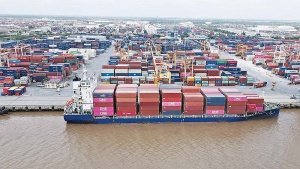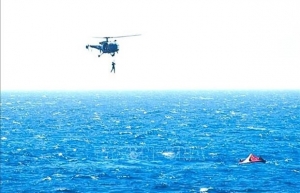Logistics groups must work to mitigate Red Sea route tensions
The impacts on import-export and logistics activities in the Red Sea area currently directly affect the routes to the European market and North America.
 |
| Le Quang Trung, cice chairman, Vietnam Logistics Business Association |
Red Sea tensions have caused mainline operators to change their routes, extending shipping time from seven to 10 days because they have to travel around the Cape of Good Hope. This also increases freight rates and other surcharges by about 80 per cent of the total freight cost of a business, which means that it causes an increase of about $1,500-2,200 per container.
The most affected products include textiles, footwear, furniture, and electronic products. This price increase not only affects businesses’ logistics costs, but also hurts other commercial commitments, such as delivery deadlines and production planning arrangements.
On the other hand, some agricultural and aquatic products such as fruits and vegetables may have their quality affected due to the ripening process during transportation. Therefore, countermeasures are needed.
Logistics service providers and businesses in Vietnam are taking actions to mitigate losses. They use other means of transport like railway and road instead of sea.
Over the past days, the Ministry of Industry and Trade and the Vietnam Logistics Business Association have been proactive in supporting businesses in updating information as well as guiding them to monitor actual developments in freight rates, or update new train schedules so that logistics companies can coordinate with manufacturers in proactively planning and responding to other disadvantages.
We are aware that this unstable situation may persist, in addition to other geopolitical tensions such as Israel-Hamas war and prolonged conflict between Russia and Ukraine.
Therefore, we recommend that import-export businesses and logistics businesses must be very proactive in closely monitoring the situation and coming up with appropriate options to work and discuss with partners to have alternatives in the logistic chains.
The logistics chain related to domestic transportation or for some high-value goods, instead of choosing traditional sea transport, should combine other modes of transport such as air, rail, or barge loading.
As for partners whose buyers are in Europe or the United States, it is necessary to work specifically to prevent extended times for packing and receiving goods.
In addition, businesses must also continue to seek and diversify supply sources to limit adverse effects in the supply chain. Especially when signing or negotiating commercial or transportation contracts, businesses need to add provisions related to compensation and exemption from liability in emergency situations.
These contracts must have full insurance to prevent risks and goods damages when going through this route and having problems, or losing quality due to prolonged transportation time.
Vietnamese logistics businesses do not benefit from the increase in freight prices, but in fact this affects the competitiveness of Vietnam’s import and export goods. The profits from increased freight rates mainly go into the pockets of mainline operators.
To improve Vietnam’s international container transport capacity and reduce dependence on such operators in the long term, the domestic logistics industry needs to set a goal of developing Vietnam’s shipping fleet and reefer container supply system.
It is necessary to have a long-term policy in investing in international shipping fleets with Vietnamese brands so that we can be proactive when there are stability issues like this. Currently, almost all long-haul goods, such as goods from Vietnam to the US or Europe and vice versa, are handled by about 10 mainline operators from around the world, but Vietnam does not have a shipping company with such a big size fleet, or a system to connect directly by ship to Europe and the US.
 | Businesses start to feel impact of Red Sea shipping crisis The Red Sea shipping crisis may put a squeeze on Vietnam-based businesses as it lingers on with no foreseeable end in sight. |
 | Citizen protection carried out for Vietnamese sailors on ship attacked on Red Sea The Vietnamese Embassy in Egypt and Djibouti is taking citizen protection measures for Vietnamese sailors working on the Barbados-flagged True Confidence cargo ship which was struck by a Houthi ballistic missile off the coast of Yemen on March 6. |
What the stars mean:
★ Poor ★ ★ Promising ★★★ Good ★★★★ Very good ★★★★★ Exceptional
Related Contents
Latest News
More News
- A golden time to shine within ASEAN (February 19, 2026 | 20:22)
- Vietnam’s pivotal year for advancing sustainability (February 19, 2026 | 08:44)
- Strengthening the core role of industry and trade (February 19, 2026 | 08:35)
- Future orientations for healthcare improvements (February 19, 2026 | 08:29)
- Infrastructure orientations suitable for a new chapter (February 19, 2026 | 08:15)
- Innovation breakthroughs that can elevate the nation (February 19, 2026 | 08:08)
- ABB Robotics hosts SOMA Value Provider Conference in Vietnam (February 19, 2026 | 08:00)
- Entire financial sector steps firmly into a new spring (February 17, 2026 | 13:40)
- Digital security fundamental for better and faster decision-making (February 13, 2026 | 10:50)
- Aircraft makers urge out-the-box thinking (February 13, 2026 | 10:39)

 Tag:
Tag:













 Mobile Version
Mobile Version